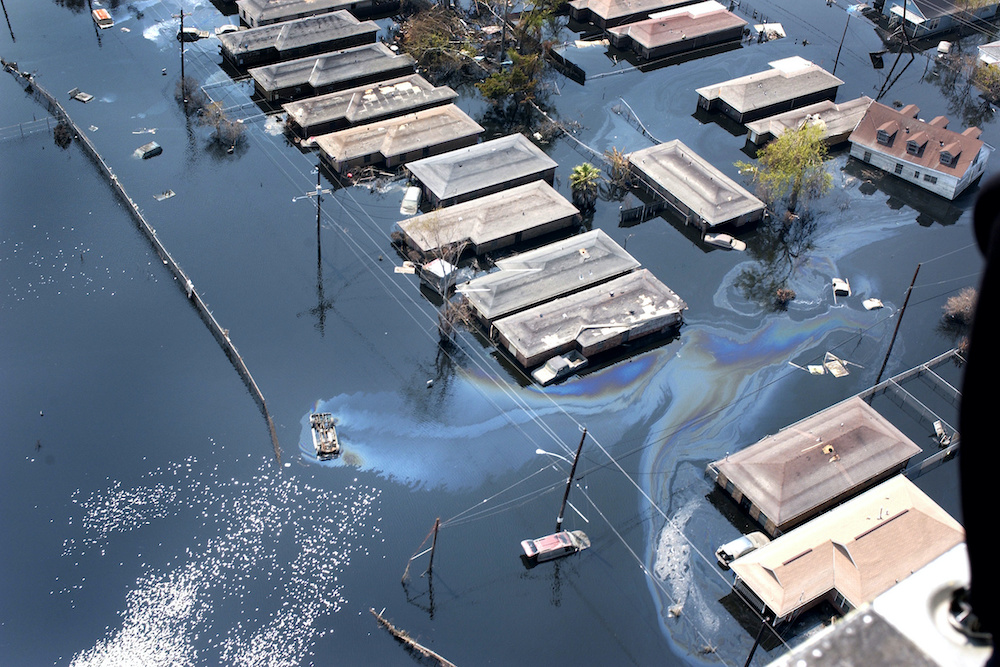
Homes are seen surrounded by floodwaters and oil slicks in St. Bernard Parish, south of New Orleans, after Hurricane Katrina swept through the area in 2005. (CNS/Clarion Herald/Frank J. Methe)
Robert Bullard is no stranger to how racism pollutes everyday life in America.
The professor of urban planning and environmental policy at Houston's Texas Southern University has watched closely as America again confronts its long record on racism in the wake of the deaths of George Floyd and others. Bullard's decades of study make it clear that racism goes deeper than policing — it plays out in housing, food access, development and the environments where we live.
Considered the father of environmental justice, Bullard became involved in that movement before it ever had a name. In 1978, he conducted research on landfill locations in Houston for a class-action lawsuit that his wife, Linda McKeever Bullard, an attorney, was working. What he and his students found was that all five municipal landfills were located in black neighborhoods, as were nearly every privately owned landfill and city-owned incinerator. Or put another way, from the 1930s through 1978, approximately 82% of Houston's garbage was dumped into black neighborhoods, representing a quarter of the population.
That case, as well as several others, formed the early moments of the environmental justice movement.
"All communities are not created equal," Bullard told NCR's EarthBeat. "There are some that are more equal than others. And if a community happens to be poor, working class or a community of color, it generally receives more than its fair share of things that other people don't want. That's the injustice involved."
"And it's more than just environmentally. It also involves health and wealth. When these many facilities [like landfills, power plants, refineries] are placed near homeowners, they lower the property value, which means lowering wealth. They also create pollution, which is also impacting health. So it's a double whammy that we're fighting."
Bullard recently spoke with EarthBeat about America's current moment of reckoning with racism, and how environmental justice factors into it. Below are excerpts from that conversation, edited for clarity and length. You can also watch the full interview at the top of the page.
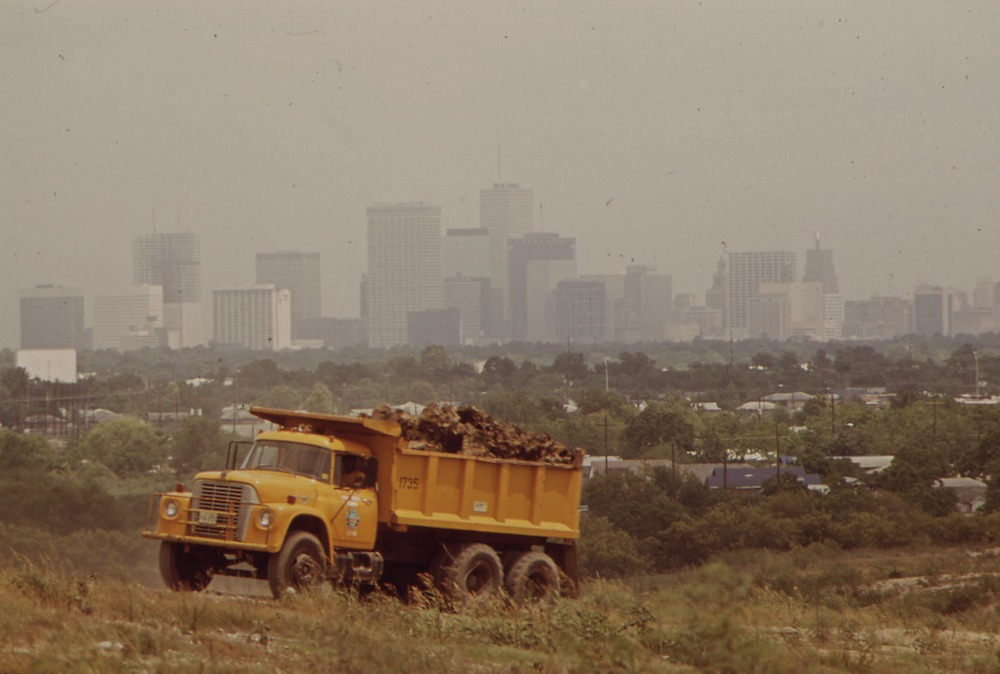
The Houston skyline is seen from the Holmes Road landfill in this May 1972 photo. A study by sociologist Robert Bullard in 1979 found that the majority of the Houston metro's garbage was dumped near black communities. (Wikimedia Commons/U.S. Environmental Protection Agency)
EarthBeat: I thought a good place for us to start with is just the concept of environmental justice itself. How would you define that?
Bullard: Well, environmental justice embraces the principle that all communities are entitled to equal protection of environment, housing, transportation, energy, food security. And that no community should be somehow discriminated against or left out because of their race or income or their location.
With the protests that are happening now in response to the killings of George Floyd, Breonna Taylor and Ahmaud Arbery, and others, the nation's at a new moment of reckoning with racism. What does Black Lives Matter mean in the context of environmental justice?
Well, it's really center. And if you look at the birth of the environmental justice movement in early '80s, in Warren County, [in North Carolina] it was about fighting environmental racism. It was about … targeting a black community for toxic waste dumping. And the decision that went into making the choice for where to go, it was totally based on race.
… And so the convergence of this whole issue of environmental racism and racism in policing and the deadly killings and choking of black people and seeing these televised lynchings, it's come full circle. And so it's one movement, and that movement is for justice. And it's a movement to dismantle systemic racism that's causing communities not to be able to breathe because they're encircled with polluting chemical plants and refineries and other kinds of emissions. As well as the deadly choking of the breaths of unarmed individuals and taking those lives and while people call for "I can't breathe."
That is the drama and the extent to which these things connect. It's really incredible, and to see over these many years that the dots are now being connected. And the underlying condition is racism. The underlying condition is systemic, institutionalized racism. And then you add on top of that the pollution that's killing people, and then the policing, the deadly policing that's killing people. And then you add COVID, coronavirus also because of the underlying conditions that many of our people live [with], and particularly poor people and African Americans and other people of color. COVID-19 is hitting our communities especially hard. And because of pollution, because of asthma and respiratory illnesses, diabetes, heart disease, stroke, we're seeing that kind of deadly attack also occurring.
And so we're fighting on a number of fronts. … We all are saying now it's time to dismantle racism and own up to this fact that America's DNA is stamped with racism. And we need to unpack and we need to dismantle that evil and violent system.
We're not just fighting pollution. We're fighting for a good economy that can provide good, healthy and sustainable lifestyles for everybody.
—Robert Bullard on environmental justice
You mentioned connecting the dots of these different challenges, whether it's racism, the pandemic, pollution, all of these things. It reminded me of what Pope Francis has talked about in his encyclical Laudato Si', where he says that everything is connected, and hearing the cry of the Earth at the same time as the cry of the poor. What power does that message from a prominent religious leader add to the environmental justice movement? And what role can faith communities play in environmental justice?
Well, you know that the environmental justice movement is an extension of the civil rights movement and the struggle for human rights. And some of the first major movement-building strategies came out of the church. Came out of the United Church of Christ Commission for Racial Justice, a black civil rights organization based in a white denomination.
And so we've had collaborations with the various denominations, in terms of United Church of Christ, United Methodist, Catholics, Lutherans. And so again that civil rights history … filters into our environment justice movement. You know, Dr. King was a Baptist minister.
And the idea of religion playing a major part in the modern civil rights movement, it's playing a major part in our environmental justice movement in terms of the constituencies that … use their church as their meeting place for fighting, fighting for justice. And many of our priests and ministers and moms have really worked very hard to challenge the institutional framework that will keep pollution somehow concentrated in one area, but we know that ultimately it will affect us all. Because there's one Earth. And when we don't protect the most vulnerable, we place everybody at risk.
And so we here are talking about justice for all. We're talking about making sure that no community is left behind, whether it's during a disaster — natural or man-made — or whether it's during a pandemic, like right now, or whether it's talking about addressing issues of affordable housing, healthcare or policing. And I think the religious leaders have a major role and have always played a major role when it comes to justice issues. And I think that's a good thing.
Advertisement
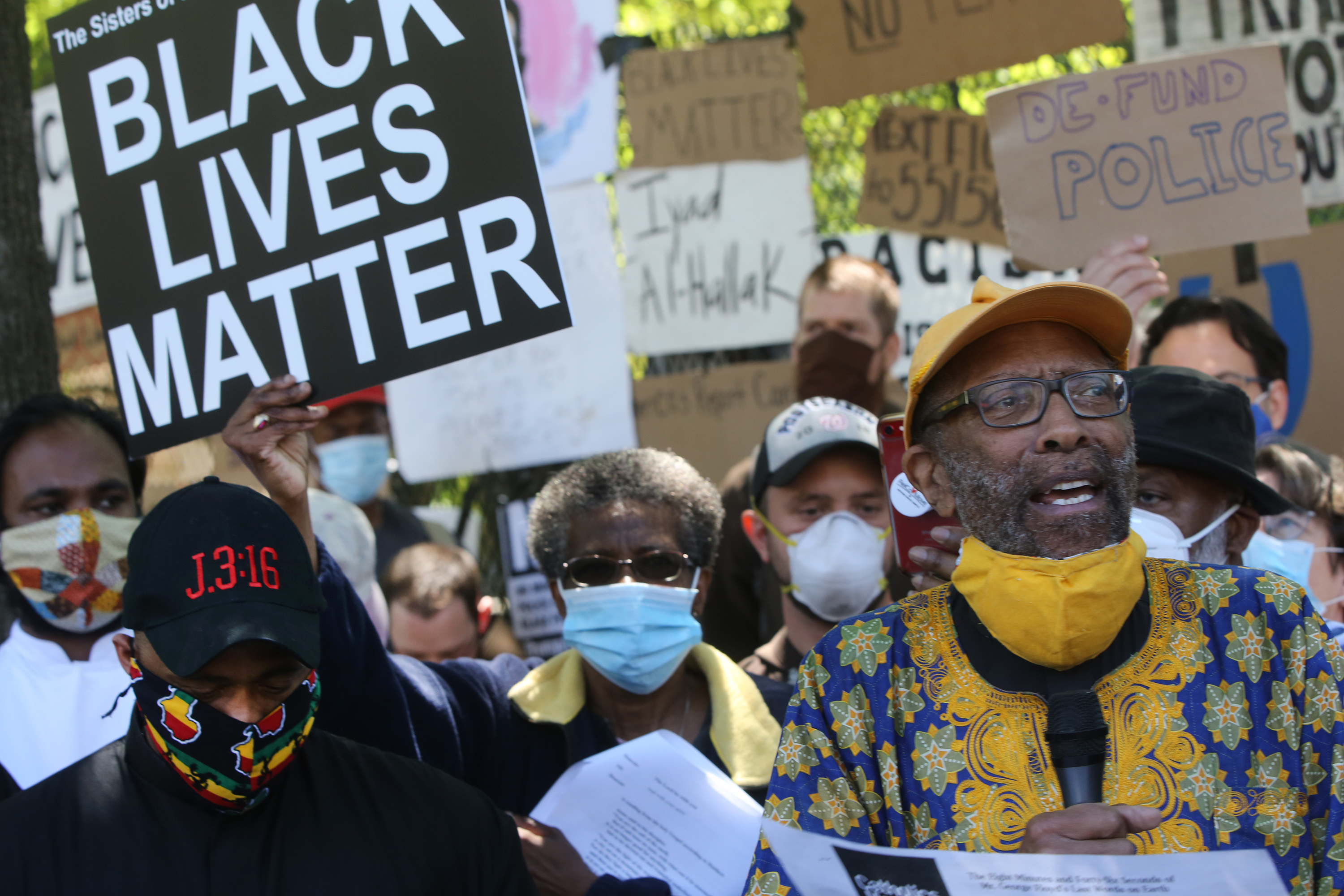
Msgr. Ray East, pastor of St. Teresa of Avila Catholic Church in Washington, speaks during a prayerful protest outside the White House June 8, 2020, following the death of George Floyd, an unarmed African American man whose neck was pinned to the ground by police for more than eight minutes before he was taken to the hospital. (CNS/Bob Roller)
There's been a lot of talk lately about the need for uncomfortable conversations to be had, especially among white people around race and privilege. What are some of those conversations that white people should be having around race and the environment?
I think it's important that that conversation around race occurs among white people. And I think in some cases it needs to occur when people of color are not in the room, so you can really get honest, really brutal about what is going on in this country.
And I think, you know, when I talk with many of my white brothers and sisters, we get really real. And in some cases, if it's happening for the first time, a lot of whites will get on, or are put on, the defense. And my thing is no, no, I'm not saying you own slaves. "Like, well, I didn't own any slaves." So what? To unpack white privilege. And to unpack the fact that there are certain advantages built into our economic system, our political system, social systems and systems of advancing in our society that whiteness comes with certain types of privileges. And if you're not white, there are taxes or there are certain types of penalties that are artificially applied, whether it's in housing, education, employment — advancing across the board. Whether it's what kinds of communities people are allowed to live in. Even when they have money, there are certain barriers that occur in our society.
And we have to not let race somehow divide us. Because there's only one race — that's the human race. Race is a social construct. I'm a sociologist, and there's a whole field of sociology that deals with race and race relations. So we have to own those conversations.
… And this is not a sprint, this is a marathon kind of a race. Because we're talking 401 years that African Americans and Africans were brought to these shores. And again, 1619 is a long time ago. And none of us were around in 1619, but what the vestiges of institutionalized racism and the vestiges of slavery, what came after, are still with us today. And we need to unpeel the onion and pick those layers off and say how we're gonna fix this. And I think it will require some hard work. This is not going to be easy. If it was easy, we would have done it years ago.
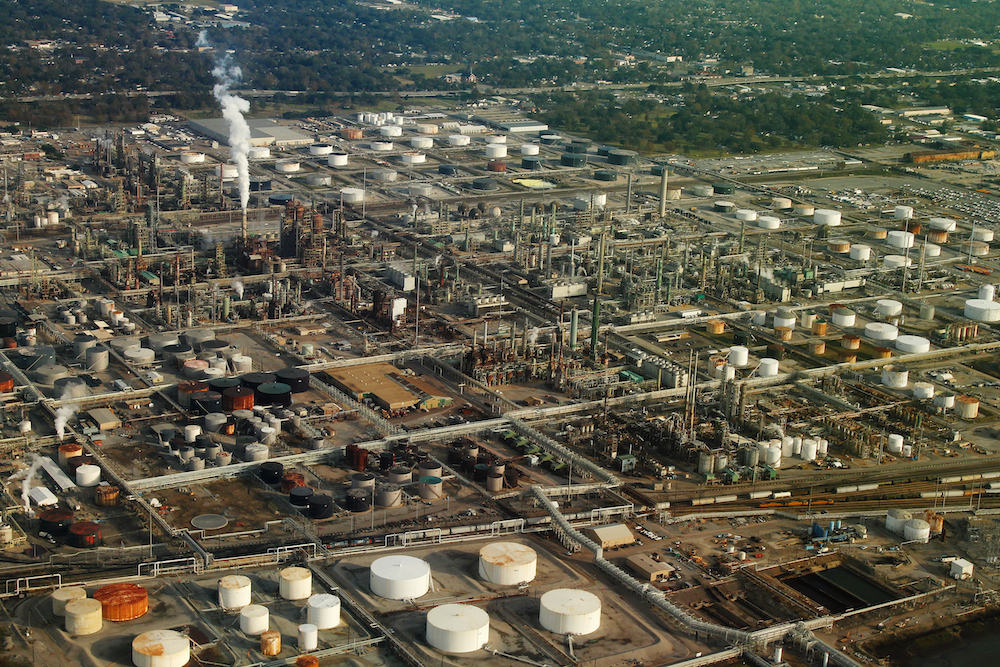
An oil refinery site in Baton Rouge, Louisiana is shown in this 2012 aerial photo. (Wikimedia Commons)
In terms of solutions, there's a lot of ideas being thrown out there right now. In terms of environmental justice, what do those solutions look like in addressing racism?
I think what we have to do when we talk about environmental racism and environmental justice, we have to talk about what really essentials are. That means that all communities should have a right to a clean and healthy, livable environment. That no community should somehow be targeted for things that other people don't want. We want a healthy, livable environment.
We're talking about changing our whole paradigm in terms of what kind of economy we should have. And if we are moving to a clean energy, renewable energy green economy, then that economy should not leave people behind just because they're poor, just because they're people of color. We're talking about a just transition that will be inclusive.
When we talk about environmental justice, it's also talking about health equity. Making sure that people have access to health care, access to a safe workplace. And we're talking about employment opportunities where people have not a minimum wage, a livable wage. And that people can have employment and opportunity that they can take care of their families and live out the American dream. Buy homes and being able to buy homes and live in housing that's not in floodplains and next to the refinery, the landfill.
We talk about education and making sure that educational opportunity is open to all. You know, everybody's not going to be able to go to college or university, but making sure that junior college and community colleges are available to young people. And making sure that there are skills and training that people can get jobs, so that they can have good careers and that kind of thing.
And so, environmental justice involves all of that. We're not just fighting pollution. We're fighting for a good economy that can provide good, healthy and sustainable lifestyles for everybody. Parks and green space. Good farmers markets and good access to supermarkets and other kinds of grocery stores that can make people have access to alternatives of just going to the fast food and eating all the junk. … That's what environmental justice is all about. And that's what we will be pushing for as we look at these candidates for the presidential races, for the governorships and for the legislature, the city council, county commissioners, school boards.
A lot of environmental groups have come out and issued statements, some of them acknowledging the wider environmental movement's lack of diversity or struggles itself with racism or inequalities within that movement. What would it look like for the wider environmental or climate movement to put environmental justice at the center of their work?
What we have been saying for many years is that the green groups or the mainstream environmental groups, which are pretty much still white, have to take into account that this country is changing demographically, and their organizations need to change with it.
And as we move to 2045, when the majority of the people in this country will be people of color, I'm saying the organizations that are out there working on the environment and conservation and climate need to take into account these changing demographics and to start to acknowledge the fact that many of the agendas that they have may not necessarily reflect the priorities of that emerging majority.
And I think that to understand that diversity also means diversity on their boards and staffs and their agendas, but diversity also mean making sure that we diversify the green dollars that are going to environmental work. … Climate change has to be more than parts per million and greenhouse gases, that it also has to be about impacting those vulnerable communities and those frontline communities and the policies that get put in place to show that when we address climate mitigation and adaptation, that equity, fairness and justice run throughout those planning.
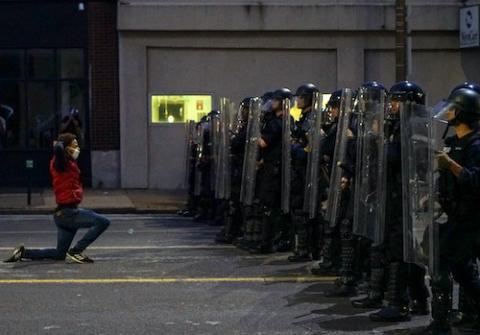
A man kneels in front of police officers in St. Louis June 1, 2020, during a protest following the death of George Floyd. (CNS/Reuters/Lawrence Bryant)
Are you optimistic that this can be that moment that brings about justice across the board in all those areas?
I am optimistic. And I am hopeful, and this time seems different. I've been in different movements for decades, and I've seen change. … Being a student of history and a student of sociology, I know that every social movement that has been successful in this country has had a strong youth, student and young people's [involvement] driving the movements. And when we have this intergenerational movement as I see today, and as you can see in living color across the television set and across the globe, you can see the enthusiasm.
And I think the important thing that you see is the urgency, that unlike many fits and starts of outrage, this one seems, I want to say, different. An understatement maybe, but that that different-ness, I think, holds hope for us getting it right. And that you see people who are coming together who probably this may be their first march or their first major demonstration. And it's occurring at a time that we are experiencing a pandemic, and the fact that there are dangers out there, and there are dangers when you go back home. But again, we have to talk about this is a crisis.
And the latest poll shows that 80% of Americans feel that this country is out of control. We need to get back control of our country, and what we stand for. America is a great country and we have to make sure that we live up to that creed, that north star that we want to be the best America that we can. And I think that is what we should be shooting for as we mobilize and organize and educate, to transform this country to become the best that it can be.
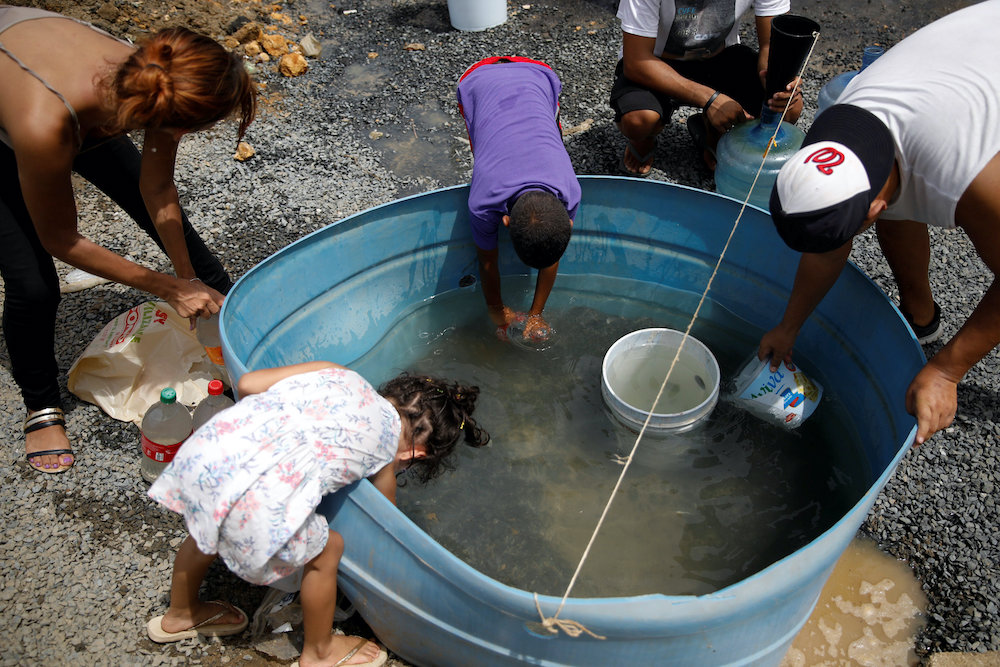
Displaced people fill containers with water Sept. 26, 2017, in Canovanas, Puerto Rico, in the aftermath of Hurricane Maria.(CNS/Reuters/Carlos Garcia Rawlins)
[Brian Roewe is an NCR staff writer. His email address is broewe@ncronline.org. Follow him on Twitter: @BrianRoewe.]





